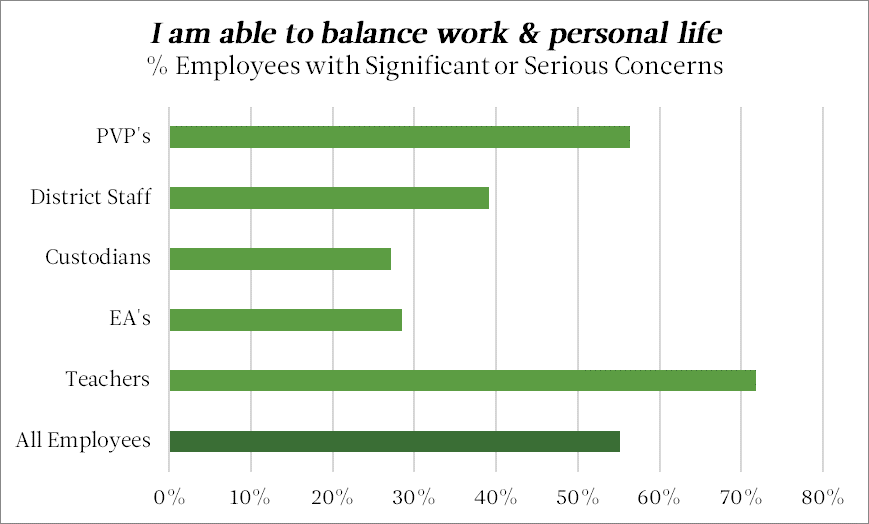Guarding Minds at Work: A Key Tool in Assessing Wellbeing in K-12 Education
Introduction
K-12 education staff play an essential role in nurturing students’ wellbeing and academic success, yet they also experience high rates of stress and burnout. Low levels of educator wellbeing lead to decreased morale and staffing-related challenges. It also has negative ripple effects on the wellbeing and success of students.
This article explores the value of the Guarding Minds at Work (“Guarding Minds”) survey tool in facilitating meaningful improvements to workplace wellbeing in Canadian school districts. Guarding Minds assesses psychological health and safety – the workplace factors that affect wellbeing. The survey findings can support meaningful conversations with employees that lead to a more supportive and psychologically safe environment for working and learning.
A Customized “Deep-dive”
Many school districts want to support their staff’s wellbeing- so they provide mindfulness apps, free yoga classes and wellness tips. These can be helpful for some. Other districts develop in-house surveys with self-assessments of wellbeing and feedback on district-led plans.
The first step in making significant and lasting improvements is Identifying the underlying issues affecting employee wellness. Guarding Minds hones in on the workplace issues and conditions affecting wellbeing, providing a window into educators’ feelings and perceptions about how their work environment affects their wellbeing.
The survey’s evidence-based psychological health and safety factors help pinpoint aspects of the workplace that warrant specific attention. Each element includes sub-statements that help make the issues more tangible and provide clues to how to take targeted action. For example, the Involvement and Influence factor includes the statements “My suggestions are considered at work” and “I am informed about important changes at work in a timely manner.” If a survey result comes back with “significant” results for those statements, then the district has a concrete area of action to improve employee wellbeing.
Why choose Guarding Minds over other survey tools?
- Evidenced-based. Developed by leading Canadian researchers. Based on the National Standard of Canada for Psychological Health and Safety in the Workplace and aligned with ISO 45003, the global standard that gives practical advice on managing psychological health in the workplace.
- Free! Guarding Minds at Work is free for all Canadian-based school districts and
- Actionable data. Guarding Minds produces lengthy, detailed reports identifying areas of concern and strengths.
- Links to evidence-based strategies. Guarding Minds reports include links to evidence-based strategies to address identified areas of concern.
- Widely used. Guarding Minds has been successfully used by dozens, if not hundreds, of Canadian school districts.
- Available in English and French.
Employee Group Segmentation
School districts include a wide range of employees. A teacher’s challenges are very different from those of a custodian. While it’s helpful to know that 55% of employees have problems balancing work and personal life, knowing 72% of teachers are struggling allows districts to focus on solutions tailored to teachers rather than more generic ones.

” Segmenting” district data by employee group can provide more nuanced insights into what’s happening on the ground. School districts have found this segmentation extremely valuable. It has helped them tailor strategies to address the needs of specific groups. However, this segmentation multiplies the volume of Guarding Minds reports that must be analyzed. Well at Work‘s advisors’ team has developed specific tools and resources that support districts to make sense of their Guarding Minds data and move to action.
Empowering Leaders with Evidence-Based Strategies
Guarding Minds identifies areas of strength and where action is needed to improve workplace wellbeing. By highlighting crucial issues such as bullying, harassment or discrimination, Guarding Minds helps leaders take swift action and avoid risks to employees and the organization. Guarding Minds considers a comprehensive array of factors that influence workplace wellbeing. It assesses critical issues, including burnout, trauma, stress, and inclusion. By encompassing these vital areas, Guarding Minds helps school districts foster an inclusive work environment that supports employees’ wellbeing and diverse needs.
Guarding Minds reports also link education leaders to evidence-based strategies for specific areas of concern.
The powerful data and evidence-based strategies enable leaders to take informed action and initiate positive changes to enhance workplace wellbeing.
Conclusion
Many Canadian school districts have found Guarding Minds indispensable in enhancing workplace wellbeing. Its alignment with leading standards, focus on actionable areas of improvement, and evidence-based strategies make it essential to understanding an organization’s current state of wellbeing. The first step to making a change is to understand the current state of wellbeing: Guarding Minds is an excellent place to start.
Photo: Getty Images Pro
First published in Education Canada, September 2023
Supported by:

Resources
- Guarding Minds at Work website includes information on using the survey and the survey itself. Reports are instantly available when the survey is closed. Available in English and French. Free to all Canadian organizations.
- Workplace Strategies for Mental Health. A companion website to Guarding Minds at Work, it provides resources, workshops, strategies and materials to support psychological health and safety in the workplace. Available in English and French. All materials are free.
- Contact our Well at Work team to learn how we can support your school district in implementing Guarding Minds. Our Springboard for Workplace Wellbeing package comprehensively assesses workplace wellbeing, including Guarding Minds set-up support, data analysis, and stakeholder interviews. Learn more.
